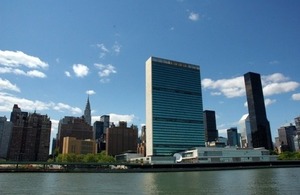‘UK welcomes the International Day against Nuclear Testing and is entirely committed to the goals of CTBT’
Statement by Ambassador Peter Wilson, Deputy Permanent Representative of the UK Mission to the UN, to the Informal Meeting of the General Assembly to mark the Observance of the International Day Against Nuclear Tests

United Nations
Mr President, This is my first week as the United Kingdom’s Deputy Permanent Representative to the UN in New York. I am pleased that my first intervention is at this meeting, on a priority issue for my Government. My delegation fully supports the statement by Carl Hallergard, Political Coordinator of the Delegation of the European Union, on behalf of the European Union.
Putting in place a legally binding ban on nuclear weapons test explosions is one of the UK Government’s key disarmament and non-proliferation priorities. The UK was among the first to sign and ratify the Comprehensive nuclear Test Ban Treaty, and has since that point been a staunch advocate of it. We welcome the signing of the Treaty by Niue in 2012 and ratifications by Brunei Darussalam, Chad, Guatemala and Indonesia. Every ratification significantly strengthens the Treaty. As Under Secretary-General Kane said on behalf of the Secretary-General, we again call on the eight remaining Annex II countries that need to ratify the Treaty to do so as soon as possible, so as to bring about the CTBT’s entry into force.
The UK would like to take this opportunity extend its very warm welcome to the new Executive Secretary of the CTBT Organisation’s Preparatory Committee, Dr. Lassina Zerbo, and to assure him that the UK will assist him in his work in any way that we can.
The UK has supported the CTBT Organisation in the establishment of the International Monitoring System. We have provided expert advice in seismology, radiochemistry and on-site inspection to help realise the objective of having a viable and effective verification system by the time the Treaty enters into force. As Dr Zerbo said, the necessity and growing credibility of the International Monitoring System was demonstrated earlier this year, when it detected the detonation of a nuclear device by the Democratic People’s Republic of Korea on 12 February. The UK strongly condemned in the strongest possible terms the continued development of nuclear weapons and a ballistic missile programme by the DPRK in direct violation of UN Security Council Resolutions.
The UK is also deeply involved in helping to develop the Treaty’s on-site inspection capability. We have contributed, for example, to the three major Provisional Technical Secretariat On-Site Inspection (OSI) build-up exercises held in 2012 and 2013 and we hope that the Integrated Field Exercise in Jordan next year will further demonstrate consolidation of, and advances in, OSI operational capabilities.
The UK hosted a P5 CTBT verification experts’ technical meeting in Vienna in March this year to identify areas for future collaboration in order to address problems facing completion of the Treaty’s verification regime.
Mr President,
The UK has been working hard not only to strengthen the CTBT, but to make concrete progress across the disarmament regime. We have demonstrated our commitment to this through our active work in numerous multi-lateral disarmament fora and our work on realising the action plan agreed at the 2010 NPT Review Conference.
The UK instigated the P5 Conference process in 2009, providing a forum for the nuclear-weapon states to build a common understanding and develop trust when it comes to disarmament issues. We look forward to the fifth P5 conference to be held in Beijing next year. The UK has also sought to engage with non-nuclear weapon states on disarmament. This is most evident in the UK-Norway Initiative, a collaborative research programme looking at the technical aspects of nuclear warhead dismantlement verification.
The UK is also keen to be as transparent as possible in its disarmament work. The UK has, I believe, demonstrated a high level of transparency about both the nuclear capabilities that we possess and about the role that they play within UK defence doctrine, and has also been transparent about the reductions in our nuclear weapons stock pile, as set out in our Strategic Defence and Security Review in 2010.
Mr President,
The UK welcomes the International Day against Nuclear Testing and is entirely committed to the goals of CTBT and to the wider multilateral disarmament framework. Entry into force of the Treaty would be a tangible step towards a safer and more secure world.